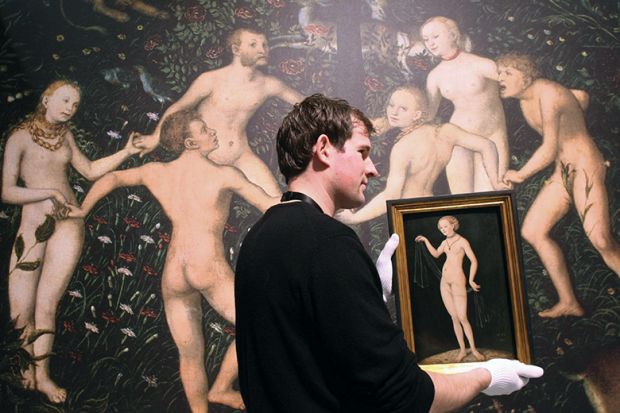Erotic love, supposedly primordial, is a strange fusion of natural and artificial, animality and transcendence, anomaly and convention, self-absorption and self-sacrifice. According to Max Weber, as religion became “rationalised” and ascetic, “sexual intoxication” no longer fitted into its rites and was “sublimat[ed] into ‘eroticism’”. Thus, while it seems “a gate to the most irrational and thereby real kernel of life”, eroticism, argued Weber, is “precisely a…turning away from the naive naturalism of sex”, only giving access to what has first – in courtly love, romance or pornography – been “consciously cultivated” and fenced off.
Finn Bowring, a sociology lecturer at Cardiff University, surveys the concoction, portrayal, analysis and enactment of erotic love through nine multidisciplinary, chronological topics, which consider – as well as Weber – Plato, medieval courtly love, marriage in 18th-century England, Jane Eyre, D. H. Lawrence, Émile Durkheim and Michel Foucault.
He starts with the erotic and pedagogic bond, standard in ancient Athens, between a youth and an older man, and with how Plato both presupposed and subverted this. He claims that the account of erotic love presented by Socrates (Plato’s mouthpiece) in the Symposium is often disparaged as “spiritualised egocentrism” divorced from emotion, intimacy and physicality: the lover is apparently exhorted to use his lovers as steps in his own climb to knowledge of Beauty and the other eternal Forms. Bowring asserts that, rather than the beloved being a means to personal transcendence, it is the Forms that “enable us to love a person with imaginative fervour”. But what does that amount to and how does it work? Here, as elsewhere, scholarship is plentiful, but argument is scanty.
There is similar lack of salience in the chapter on Weber. Lengthy details of Weber’s marriage and (putative) love affairs are offered as essential clues, though to what is unclear; meanwhile, Weber’s insight into the contrived nature of eroticism is given only a few paragraphs, and is not only underplayed but misrepresented. “Extramarital eroticism, in particular, assumed increasing prominence as ‘the only tie which still linked man with the natural fountain of all life’,” says Bowring.
Crucially, however, Weber prefaced that quoted phrase with “could appear as”, and then proceeded to argue that eroticism, with its focus on incommunicable sensation, could also be seen as fostering “sophisticated enjoyment of oneself in the other”, along with possessiveness, brutality and “intimate coercion”. It is odd that Bowring fails to do justice to Weber’s ideas, especially since (in the book’s best chapter) he acutely expounds the related view of Denis de Rougemont on how narcissistic, rigged and death-embracing courtly love is, with passion necessarily refuelled by absence, partings and postponed gratification.
Do today’s sexual relationships rely less on intensity, narrative and “false idealisation”? Are they more egalitarian and mutual, freer of “heteronormative” and racialised constraints, and if “governed by an emotional contractualism”, is that an advantage? Are they perhaps “de-spiritualised”, commodified by capitalism? The book culminates in these questions, but, disappointingly, mostly as part of an examination of how other sociologists, not Bowring himself, have examined them. The reader is left in a morass of minutely calibrated differences between very similar theses. The book offers fascinating, wide-ranging scholarship on erotic love, but it is unclear exactly what the upshot of the exposition is.
Jane O’Grady is a co-founder of the London School of Philosophy and taught philosophy of psychology at City, University of London. She is also the author of Enlightenment Philosophy in a Nutshell (2019).
Erotic Love in Sociology, Philosophy and Literature: From Romanticism to Rationality
By Finn Bowring
Bloomsbury Academic, 224pp, £28.99
ISBN 9781350152724 (pbk)
Published 25 February 2021 (pbk)
Register to continue
Why register?
- Registration is free and only takes a moment
- Once registered, you can read 3 articles a month
- Sign up for our newsletter
Subscribe
Or subscribe for unlimited access to:
- Unlimited access to news, views, insights & reviews
- Digital editions
- Digital access to THE’s university and college rankings analysis
Already registered or a current subscriber?








